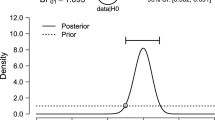Abstract
The likelihood principle (LP) is a core issue in disagreements between Bayesian and frequentist statistical theories. Yet statements of the LP are often ambiguous, while arguments for why a Bayesian must accept it rely upon unexamined implicit premises. I distinguish two propositions associated with the LP, which I label LP1 and LP2. I maintain that there is a compelling Bayesian argument for LP1, based upon strict conditionalization, standard Bayesian decision theory, and a proposition I call the practical relevance principle. In contrast, I argue that there is no similarly compelling argument for or against LP2. I suggest that these conclusions lead to a restrictedly pluralistic view of Bayesian confirmation measures.
Similar content being viewed by others
References
Backe A. (1999). ‘The Likelihood Principle and the Reliability of Experiments’. Philosophy of Science 66: S354–S361
Barnett V. (1999). Comparative Statistical Inference. John Wiley & Sons, New York, NY
Bayarri M., DeGroot M. and Kadane J. (1988). ‘What is the Likelihood Function?’. In: (eds) Statistical Decision Theory and Related Topics IV, pp 3–16. Springer-Verlag, New York, NY
Berger J. and Wolpert R. (1988). The Likelihood Principle. Institute of Mathematical Statistics, Hayward, CA
Birnbaum A. (1962). ‘On the Foundations of Statistical Inference’. Journal of the American Statistical Association 57: 269–326
Buck C.E., Cavanagh W.G. and Litton C.D. (1996). Bayesian Approach to Interpreting Archaeological Data. John Wiley & Sons, New York, NY
Carnap R. (1962). Logical Foundations of Probability. University of Chicago Press, Chicago
Christensen D. (1999). ‘Measuring Confirmation’. Journal of Philosophy 96: 437–461
Earman J. (1992). Bayes or Bust? A Critical Examination of Bayesian Confirmation Theory. MIT Press, Cambridge, MA
Edwards A. (1984). Likelihood. Cambridge University Press, New York
Edwards W., Lindman H. and Savage L. (1963). ‘Bayesian Statistical Inference for Psychological Research’. Psychological Review 70: 193–242
Eells E. and Fitelson B. (2000a). ‘Measuring Confirmation and Evidence’. Journal of Philosophy 97: 663–672
Eells E. and Fitelson B. (2000b). ‘Symmetries and Asymmetries in Evidential Support’. Philosophical Studies 107: 129–142
Fitelson B. (1999). ‘The Plurality of Bayesian Confirmation Measures of Confirmation and the Problem of Measure Sensitivity’. Philosophy of Science 66(Proceedings): S362–S378
Fitelson B. (2001). ‘A Bayesian Account of Independent Evidence with Applications’. Philosophy of Science 68(Proceedings): S123–S140
Fitelson B. (2002). ‘Putting the Irrelevance back into the Problem of Irrelevant Conjunction’. Philosophy of Science 69: 611–622
Fitelson, B.: forthcoming, ‘Relational and Non-Relational Conceptions of Evidential Support’, Synthese.
Hacking I. (1965). Logic of Statistical Inference. Cambridge University Press, Cambridge
Hawthorne J. and Fitelson B. (2004). ‘Re-solving Irrelevant Conjunction with Probabilistic Independence’. Philosophy of Science 71: 505–514
Howson C. and Urbach P. (1993). Scientific Reasoning: The Bayesian Approach. Open Court, La Salle, IL
Joyce J. (1999). The Foundations of Causal Decision Theory. Cambridge University Press, Cambridge
Joyce, J. :Unpublished manuscript, ‘On the plurality of probabilist measures of Evidentia Relevance’.
Kadane J., Schervish M. and Seidenfeld T. (1996a). ‘When Several Bayesians Agree that there will be no Reasoning to a Foregone Conclusion’. Philosophy of Science 63: S281–S289
Kadane J., Schervish M. and Seidenfeld T. (1996b). ‘Reasoning to a Foregone Conclusion’. Journal of the American Statistical Association 91: 1228–1235
Maher P. (1993). Betting on Theories. Cambridge University Press, Cambridge
Maher P. (1996). ‘Subjective and Objective Confirmation’. Philosophy of Science 63: 149–174
Maher P. (1999). ‘Inductive Logic and the Ravens Paradox’.. Philosophy of Science 66: 50–70
Maher P. (2004). ‘Bayesianism and Irrelevant Conjunction’.. Philosophy of Science 71: 515–520
Mayo D. (1996). Error and the Growth of Experimental Knowledge. Chicago University Press, Chicago IL
Milne P. (1996). ‘log[p(h/eb)/p(h/eb)] is the One True Measure of Confirmation’. Philosophy of Science 63: 21–26
Nozick R. (1981). Philosophical Explanations. Harvard University Press, Cambridge, MA
Press J.S. (2003). Subjective and Objective Bayesian Statistics. John Wiley & Sons, New York, NY
Royall R. (1997). Statistical Evidence: A Likelihood Paradigm. Chapman & Hall, London
Savage L. (1962). Foundations of Statistical Inference: A Discussion. Methuen, London
Schlesinger G. (1995). ‘Measuring Degrees of Confirmation’.. Analysis 55: 208–211
Skyrms B. (1980). Causal Necessity. Yale University Press, New Haven, CT
Sober E. (1993). ‘Epistemology for Empiricists’. In: French, P. and Wettstein, H. (eds) Midwest Studies in Philosophy, Volume XVII, Philosophy of Science, pp 39–61. University of Notre-Dame Press, Notre-Dame, IA
Steel D. (2003). ‘A Bayesian Way to Make Stopping Rules Matter’. Erkenntnis 58: 213–227
Author information
Authors and Affiliations
Corresponding author
Rights and permissions
About this article
Cite this article
Steel, D. Bayesian Confirmation Theory and The Likelihood Principle. Synthese 156, 53–77 (2007). https://doi.org/10.1007/s11229-005-3492-6
Published:
Issue Date:
DOI: https://doi.org/10.1007/s11229-005-3492-6




